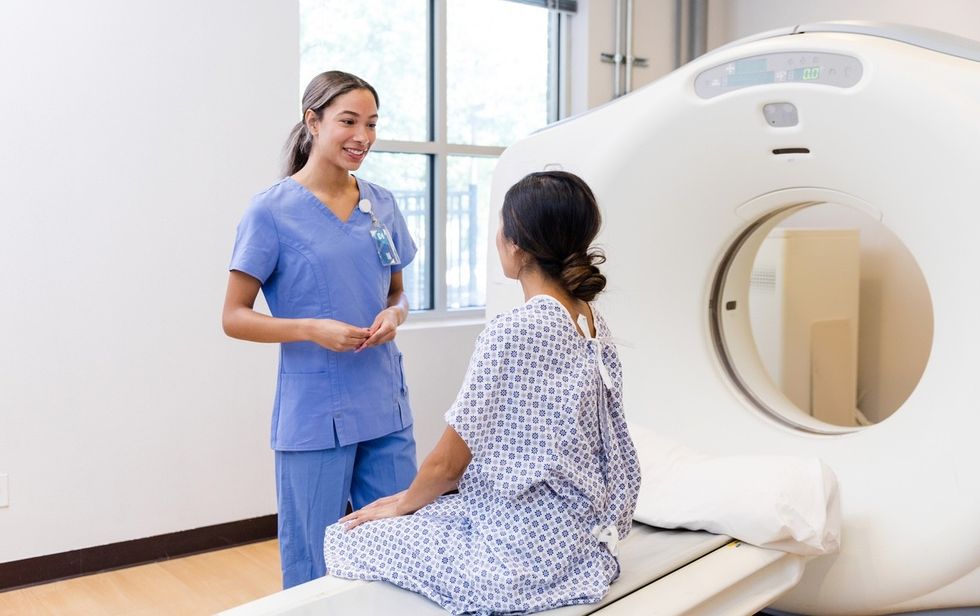The upward trend of colon cancer cases in the U.S. is astronomically high—so much so that in 2021, the U.S. Preventive Services Task Force (USPSTF) updated its recommended age for colorectal cancer screening from age 50 to 45. In most cases, a doctor will perform a colonoscopy to check for polyps and signs of cancer. Alternatively, you might request a less invasive option, such as an at-home stool test. However, there’s another test on the market that’s even less invasive and more effective, per a new study published in the journal Radiology.
RELATED: 50% of Colon Cancer Cases in Young People Tied to 1 Common Factor, Researchers Discover.
Research suggests stool tests aren’t the most effective for colon cancer screening.
A polyp is “an abnormal growth of tissue inside the colon or the rectum,” explains the Colorectal Cancer Alliance. Polyps don’t always indicate the presence of cancer, but unfortunately, there’s no way of knowing if they will eventually become cancerous. Thus, “it’s always best to remove polyps to prevent cancer from developing,” advises the Alliance.
For this reason, a colonoscopy is “the preferred method” of screening among medical professionals, “due to its cancer prevention abilities in removing benign precancerous polyps during the procedure,” according to public health professor Perry J. Pickhardt, MD.
Comparably, at-home stool tests are less invasive and technically more affordable—albeit, going this route can still rack up a hefty medical bill if additional testing (in the event of a positive stool result) and/or polyps extraction is required.
“In the U.S., conventional colonoscopy remains the dominant screening test for colorectal cancer, despite the fact that it is the most expensive and invasive option,” Pickhardt, lead study author and a professor of radiology and medical physics at the University of Wisconsin School of Medicine and Public Health, said in a news release.
But thanks to recent strides, there’s one kind of non-invasive colon cancer screening test that’s becoming increasingly accessible. Better yet, it’s covered by Medicare, and doctors like Pickhardt say it’s more effective than at-home stool tests.
RELATED: Colon Cancer Risk Drops With This 1 Simple Snack, Groundbreaking New Study Finds.
Colon CT scans yield better results than at-home stool tests, per a new study.
In the study, Pickhardt and his research team “set out to analyze mt-sDNA and CT colonography in a head-to-head comparison of clinical efficacy and cost-effectiveness.” Pickhardt deemed both procedures significantly less invasive and “much safer primary screening options” than a colonoscopy.
Multitarget stool DNA (mt-sDNA) testing kits, such as Cologuard, analyze stool samples “for specific colorectal cancer biomarkers.” Meanwhile, CT colonography relies on CT scans to “examine the colon and rectum for cancer or polyps.”
The study involved 10,000 45-year-olds, of whom 7.5 percent developed colon cancer. Participants were screened and surveyed for 30 years. During this period, they “assumed perfect adherence to screening, diagnostic follow-ups and recommendations,” per the release.
Findings show that both mt-sDNA and CT colonography were clinically more effective than no screening at all. But of the two, CT colonography displayed greater results. It reduced colorectal cancer incidence by 70 to 75 percent, while mt-sDNA had a reduction value of 59 percent.
Additionally, CT colonography was relatively more cost-saving.
RELATED: Doctors Say This Cheap Drug May Be a “Game Changer” for Preventing Colon Cancer.
The takeaway:
Prevention is your strongest defense against cancer. For middle-aged adults, especially those who are considered high risk, regular colorectal cancer screening is key—but know that you have options, some of which are less invasive than others.
“Among the safe, minimally invasive colorectal cancer screening options, CT colonography is more effective at preventing and detecting cancer—and is also more cost-effective—than stool DNA testing,” concluded Pickhardt. “Furthermore, CT colonography can provide for extracolonic screening for things like osteoporosis and cardiovascular disease.”
As always, you should raise any health concerns with your doctor. Speak with a healthcare professional who can help find the right colon cancer screening test for you.
Content shared from bestlifeonline.com.

